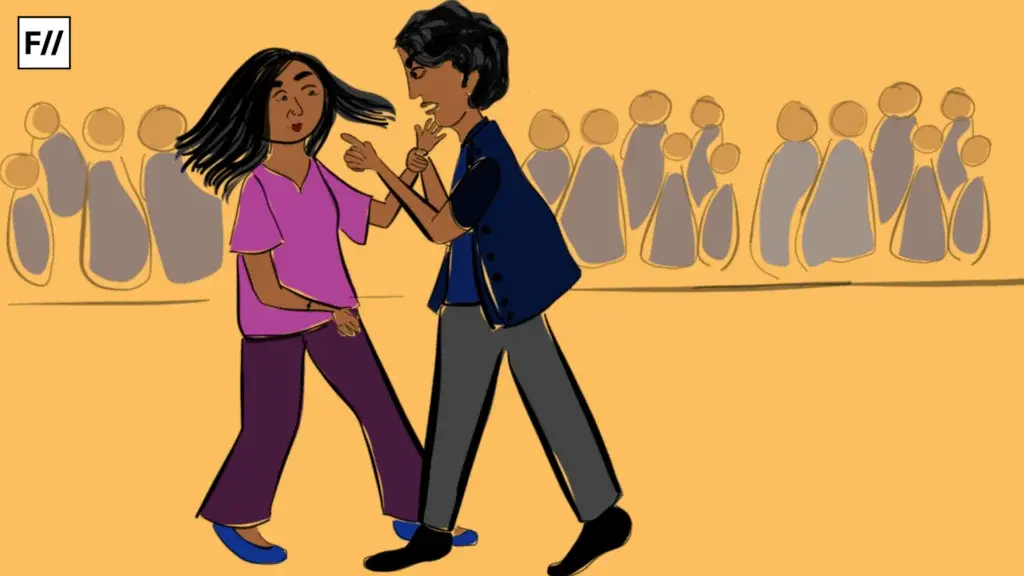It was the summer of 2015 when my family planned to spend a day at my maternal grandmother’s house in Uttar Pradesh. The evening is usually snack time there, which further extends into a gossip hour. Hence, my aunt who lives in the village started updating my Delhi-based family about the neighbourhood news.
Can you guess what the hottest news of that summer was? A drunk man beat his wife black and blue. Why, you ask? Well, he just felt like it; or maybe he was just taking out the angst of his worthless life on his wife who, by the way, still cooks him food with ‘love’; or maybe it is just a manifestation of misogyny where he finds his actions justified with no reason at all.
I don’t think there is one particular reason to point our finger at such barbaric acts which are so normalised by husbands, by wives (read survivor) and the neighbourhood. My aunts did sympathise with the lady. They also said something very enlightening – “Why did she take it all? Why didn’t she hit him back?” I am using the term ‘enlightening’ with sarcasm here and you will find out why as you read on.
So, the damage is done – the accused has beaten up his wife, the neighbours have gossiped about the incident, they have pitied the lady and everybody moves on till we hear another such story from some other house. Believe me, such stories do not take a long time to circle back as gossip.
domestic violence also includes the onlookers, the neighbours.
Yes, that is the pervasiveness of domestic violence there. I look at the whole situation with two aspects – 1) Normalisation of domestic violence in that particular area. 2) Entitling the woman (abused) with agency, just so she can be blamed later, while completely ignoring the intersectionality at play. These points are not mutually exclusive but intertwined with each other.
How I understand intersectionality is that different parameters of social identity determine an individual’s social position differently at different times, and we need to consider all of them separately and together. Juxtaposing the identities of my Delhi aunts and the survivor lady – they all are from the same caste (of course, same caste people live together in a village), same race (north-Indian, wheatish), Hindu, heterosexual, married women.
These are the identities which are similar between the two of them and ideally should be creating similar kinds of social circumstances for them. However, what is not similar between them is that all my aunts are educated, while she is not; they are working in a city, hence financially independent while she is dependent on her husband for all her financial needs; they have supportive families while she does not have any kind of support system (emotional, economic, law, counselling).
Also Read: Secret Superstar Review: Much Needed Conversation On Violent Families
Moreover, she doesn’t even know if there exists an alternative to this life or whether she has the right to raise her voice or hit her husband back. For her, being married and sustaining a husband is essential for her identity as a woman. If she fails to do so, society will ostracize her and all thanks to the conditioning with which she was brought up, being beaten up by her ‘own husband’ is considered so much better than that.
Do you know what is even worse in this already heart-wrenching story? She has kids who witness this often. She has normalised violence in the name of love and they have already accepted the norm of domestic violence in married life.
This is how domestic violence becomes a culture from an incident. It is important to note that apart from including the binary participants (victims-accused), domestic violence also includes the onlookers, the neighbours. The normalisation of this by every partaker makes it a culture.
It is one thing to sympathise with the lady and totally another to put the onus on her to get out of the situation.
I agree what the husband is doing is ruthless but by only holding the husband guilty for doing what he did will not solve the problem. In fact, before solving the problem, we need to address the incident more sensibly. As the privileged and educated lot who don’t experience such incidents, it is our prerogative to look at the issue more judiciously because we all are in this together.
It is one thing to sympathise with the lady and it is totally another thing to put the onus on her to get out of the situation. It is required to concede the fact that it is their privilege as educated and financially independent women who, by the way, also have supportive families that they are able to acknowledge domestic violence as an intolerant situation.
While for the lady who has accepted it as a way of married life, she needs to have the privilege to be able to acquire knowledge in order to understand the unacceptability of domestic violence. She neither has the knowledge nor the resources to understand how unreasonable domestic violence is or in other words, she lacks agency unlike my Delhi aunts.
Deducing from all these arguments, I used the term ‘enlightenment’ with a hint of sarcasm. By casually entitling the abused woman with agency, when the woman herself is unaware of the concept, we are only brandishing our own privileges. No, the onus doesn’t lay with the woman or the husband only, but with each one us to first address the issue responsibly.
Also Read: Why Doesn’t Aishwarya Rai Get Enough Credit For Being A Domestic Violence Survivor?
Featured Image Credit: HD Footage Stock
About the author(s)
Nidhi is a Masters in Gender Studies and a fitness freak. She is a feminist writer by day and a yoga instructor by sunrise.




